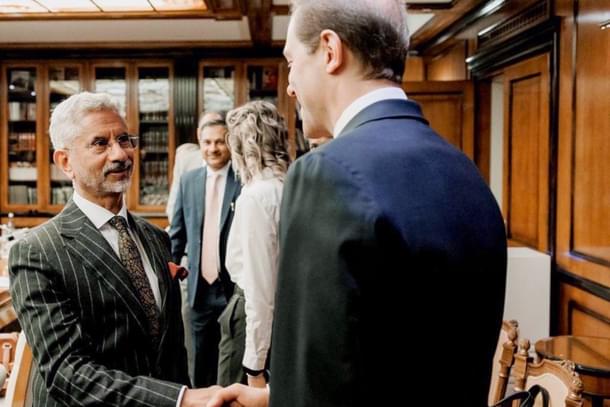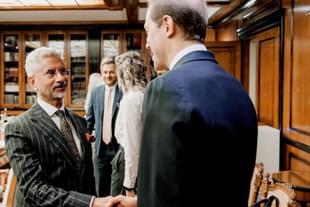World
India And Russia Resolve To Expand Economic Cooperation Including In Energy Sector
PTI
Nov 09, 2022, 08:40 AM | Updated 08:40 AM IST
Save & read from anywhere!
Bookmark stories for easy access on any device or the Swarajya app.


New Delhi, Nov 8 (PTI) India and Russia on Tuesday vowed to expand their economic engagement including New Delhi's import of petroleum products from its 'time-tested' partner even as External Affairs Minister S Jaishankar emphasized on ending the Ukraine conflict in view of growing global concerns over energy and food security.
After holding wide-ranging talks with his Russian counterpart Sergey Lavrov and Deputy Prime Minister Denis Manturov in Moscow, Jaishankar said India would be supportive of any initiative that 'de-risks' the global economy and stabilises the global order at this stage.
In his opening remarks at the meeting with Lavrov, Jaishankar described Indo-Russia relations as 'exceptionally steady' and 'time-tested' and said the objective is to fashion a contemporary, balanced, mutually beneficial, sustainable and long-term engagement between the two sides.
It was Jaishankar's first visit to Moscow after Russia launched its invasion of Ukraine in February and his talks with the Russian interlocutors came just a week before the G-20 summit in Indonesia that is expected to deliberate extensively on the conflict.
At a joint media briefing with Lavrov, the external affairs minister said any 'objective evaluation' of the relationship over many decades would confirm that it has actually served both countries very well.
On the Ukraine conflict, he referred to Prime Minister Narendra Modi's message to Russian President Vladimir Putin during a meeting in the Uzbek city of Samarkand in September that 'today's era is not of war' and that the Ukraine conflict was a dominant feature in the talks.
'As Prime Minister Modi conveyed to President Putin in Samarkand in September, this is not an era of war. The global economy is simply too inter-dependent for a significant conflict anywhere, not to have major consequences elsewhere,' he said.
'We are seeing growing concerns on energy and food security from the conflict that are coming on top of severe stresses created by two years of Covid. The Global South, especially, is feeling this pain very acutely,' Jaishankar said.
'India, therefore, strongly advocates a return to dialogue and diplomacy. We are clearly on the side of peace, respect for international law and support for the UN Charter,' he added.
Jaishankar said he and Lavrov noted the 'significant growth' in the bilateral trade this year and focused on how to make it more sustainable.
'We are naturally concerned at the trade imbalance, and I have raised with the Russian side how to address impediments that stand in the way of greater Indian exports,' Jaishankar said.
On economic ties, Jaishankar said there is a 'natural convergence' of interests between India and Russia, adding 'When we do so, we not only serve our national interest, we...as major G20 economies...are actually helping to stabilise the world economy as well.'
To a question on Western pressure on India to not buy Russian crude oil and G7's proposed price cap for Russian oil, Jaishankar said New Delhi's approach is to ensure the best possible access to energy supplies.
He said, 'India-Russia relationship has worked to our advantage. So if it works to my advantage, I would like to keep that going.' In his remarks, Lavrov described the talks as 'fruitful' and welcomed 'positive dynamics' in bilateral trade while expressing confidence in achieving the target of an annual trade volume of USD 30 billion soon.
'We welcomed the positive dynamics of bilateral trade. By September 2022, compared to the same period last year, the trade turnover added 133 per cent, almost reaching the mark of 17 billion US dollars. We are sure that the goal set by the leaders of Russia and India to increase the annual trade turnover to 30 billion USD will be achieved soon,' Lavrov said.
The Russian foreign minister said both sides were unanimous that the strengthening of the Russian-India partnership is in the fundamental interests of the two countries and would contribute to the maintenance of international and regional security and stability.
'We pointed out good prospects for cooperation in the energy sector, including an increase in exports of hydrocarbons from Russia to the Indian market and mutual participation in projects for their production, including in the Far East and on the Arctic shelf of the Russian Federation,' Lavrov said.
At the briefing, Jaishankar said India will be as helpful as it can be pertaining to issues like food grains and fertiliser shipments are concerned, or any other problem.
'Indeed, I would say that for any initiative that de-risks the global economy and stabilises the global order at this stage, India will be supportive,' he noted.
On India's import of crude oil from Russia, Jaishankar said it is India's fundamental obligation to ensure that Indian consumers have the best possible access on the most advantageous terms to international markets.
'The fact that I am here today with a delegation to review our cooperation, to see how we can take it forward, to create a long-term sustainable basis, I think, says most of all,' he said.
'For us, Russia has been a steady and time-tested partner, and as I said, any objective evaluation of our relationship over many decades would confirm that it has actually served both our countries very, very well,' he said.
'So if it has served my country very, very well for many decades, I think you can see the obvious interest and commitment I would have in keeping that relationship strong and steady,' the minister noted.
As regards the oil supply issue, Jaishankar said there is stress on the energy markets which has been created by a combination of factors.
'But as today the world's third-largest consumer of oil and gas, a consumer where the levels of income are not very high, it is our fundamental obligation to ensure that the Indian consumer has the best possible access on the most advantageous terms to international markets,' he said.
'In that respect, quite honestly, we have seen that the India-Russia relationship has worked to our advantage. So if it works to my advantage, I would like to keep that going,' he said.
The external affairs minister said India and Russia have grappled with ways to expand bilateral trade and introduce more factors of long-term stability and growth.
'Some of these discussions are now yielding results, accelerated by the stresses that the global economy is currently experiencing, including as a result of the Ukraine conflict. Minister Lavrov and I have noted the significant growth in our bilateral trade this year and focused on how to make it more sustainable,' he said.
At the same time, Jaishankar voiced concerns over trade imbalance and said he raised with the Russian side how to address the 'impediments' that stand in the way of greater Indian exports to Russia.
'We reviewed the progress of our space and nuclear programs. It is also essential that our time-tested defence relationship continues to perform smoothly,' he said.
'Notably, our energy and fertiliser cooperation has been strengthening and our achievements of the last few years have become a foundation to do more. Foreign Minister Lavrov of course has spoken about some of these issues in his remarks,' he added.
Jaishankar said the talks also focused on terrorism and climate change challenges.
In his comments, Lavrov said both sides also deliberated on the prospect of joint production of military hardware.
'We examined in detail the state of and prospects for military-technical cooperation and the joint production of modern types of weapons. We attach great importance to space exploration in such areas as satellite navigation, space science, and manned programs,' he said.
(This story has been published from a wire agency feed without any modifications to the text. Only the headline has been changed.)




